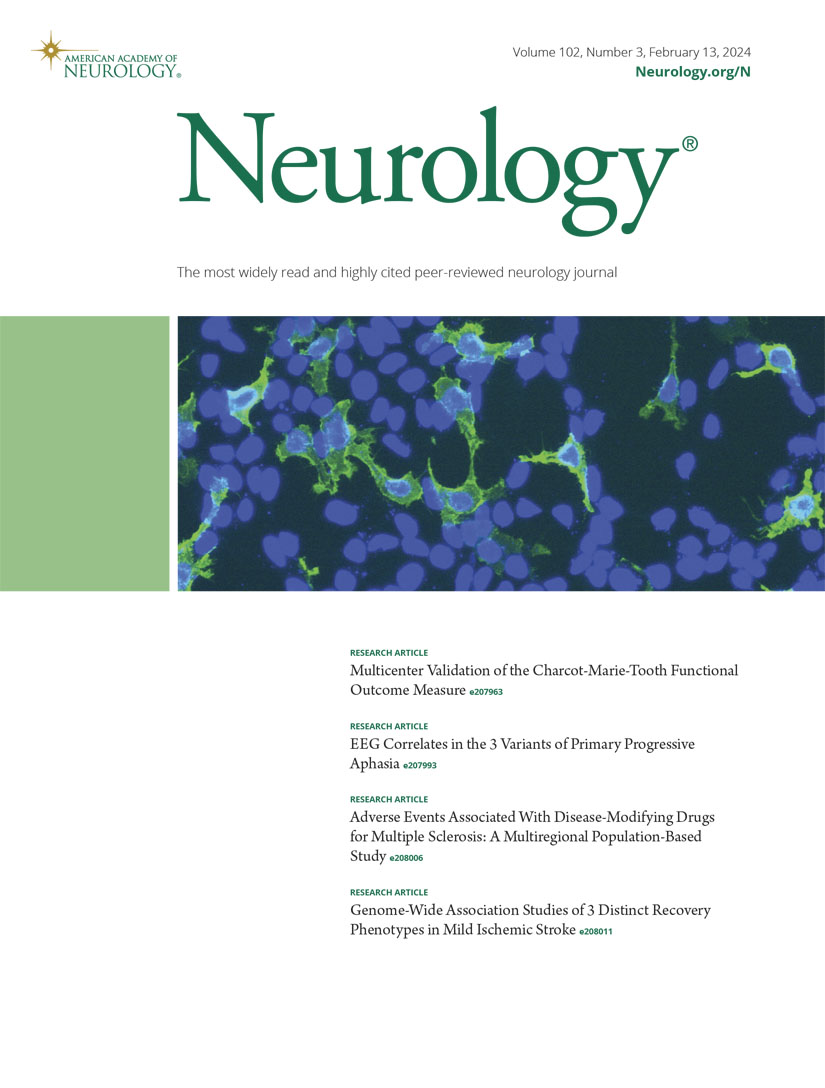Association of Early- to Midlife Weight Trajectories With Mid- to Late-Life Cognitive Decline in the ELSA-Brasil Study.
IF 7.7
1区 医学
Q1 CLINICAL NEUROLOGY
引用次数: 0
Abstract
BACKGROUND AND OBJECTIVES While midlife obesity is consistently associated with cognitive decline in later life, there is limited understanding of how weight variations from early life to midlife affect cognitive decline. We investigated the association between early- to midlife weight trajectories and mid- to late-life cognitive decline. METHODS This is a longitudinal cohort study that used data from 3 waves (2008-2019) of the Brazilian Longitudinal Study of Adult Health, a multicenter cohort study that enrolled active and retired public servants aged 35+ years from public universities in Brazil. Participants with a history of stroke, missing cognitive data at baseline, and with incomplete body shape data were excluded from the analyses. Self-reported body shapes from ages 5 to 40 using the Stunkard Figure Rating Scale were categorized as underweight, normal, overweight, and obese. Sequence analysis and hierarchical clustering identified weight trajectories. Global cognition Z-scores were derived from memory (immediate recall, delayed recall, and recognition of a word list), phonemic and semantic verbal fluency, and Trail Making Test part B (TMT-B). Linear mixed models adjusted for sociodemographic, clinical, and lifestyle covariates investigated associations between clusters of weight trajectories and global cognition Z-scores. Inverse probability of attrition weighting was used to account for attrition bias. RESULTS Among 11,361 participants (mean age: 51.5 ± 8.6, 55% women, 42.4% Black/mixed race), "normal to overweight," "underweight to normal," and "stable overweight" trajectories exhibited faster global cognitive decline than "stable normal" trajectory (β = -0.024; 95% CI -0.043 to -0.005; p = 0.015; β = -0.026; 95% CI -0.040 to -0.012; p < 0.001; β = -0.034; 95% CI -0.066 to -0.001; p = 0.043, respectively), representing 4.6-6.5 excess years of cognitive aging over a median follow-up of 8 years. Cognitive decline associated with weight trajectories was driven mainly by declines in memory and TMT-B performance. Associations were observed only in Black/mixed races and women when stratified. DISCUSSION Weight gain and stable overweight trajectories from early life to midlife were associated with faster cognitive decline than stable normal weight trajectories. Weight management during early life may mitigate cognitive decline. Study limitations include reliance on self-reported body shape data, potential recall bias, and residual confounding from unmeasured early-life factors.求助全文
约1分钟内获得全文
求助全文
来源期刊

Neurology
医学-临床神经学
CiteScore
12.20
自引率
4.00%
发文量
1973
审稿时长
2-3 weeks
期刊介绍:
Neurology, the official journal of the American Academy of Neurology, aspires to be the premier peer-reviewed journal for clinical neurology research. Its mission is to publish exceptional peer-reviewed original research articles, editorials, and reviews to improve patient care, education, clinical research, and professionalism in neurology.
As the leading clinical neurology journal worldwide, Neurology targets physicians specializing in nervous system diseases and conditions. It aims to advance the field by presenting new basic and clinical research that influences neurological practice. The journal is a leading source of cutting-edge, peer-reviewed information for the neurology community worldwide. Editorial content includes Research, Clinical/Scientific Notes, Views, Historical Neurology, NeuroImages, Humanities, Letters, and position papers from the American Academy of Neurology. The online version is considered the definitive version, encompassing all available content.
Neurology is indexed in prestigious databases such as MEDLINE/PubMed, Embase, Scopus, Biological Abstracts®, PsycINFO®, Current Contents®, Web of Science®, CrossRef, and Google Scholar.
 求助内容:
求助内容: 应助结果提醒方式:
应助结果提醒方式:


